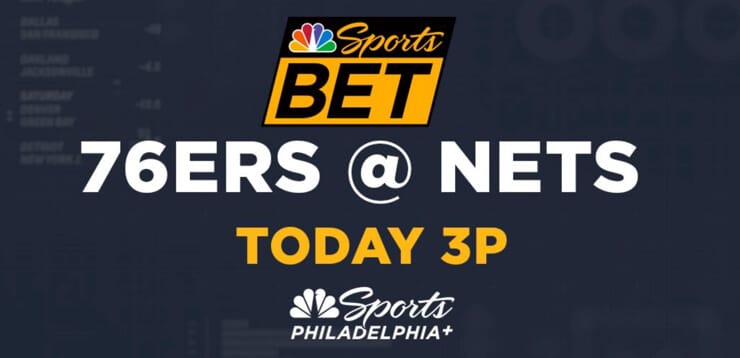With the spreading legalization of sports betting has come gradually more betting-based TV programming, and earlier this NBA season, NBC Sports Washington Plus took it to the next level with gambling-focused broadcasts of live Wizards games.
In April, the NBC Sports station in Philadelphia got in on the fun by doing the same thing with a relatively insignificant game between the 76ers and the Atlanta Hawks.
An alternative broadcast with betting at its center during the regular season is one thing. During the playoffs, it’s something else entirely. Asking hometown fans to focus on spreads and props when, to them, the game already has enormous stakes, is risky. It can be a major turnoff to a hardcore sports fan — even if that fan does have other options for watching the game with traditional commentary.
Nevertheless, the Philadelphia station went back to the “NBC Sports Bet” well with Saturday’s postseason game between the Sixers and the Brooklyn Nets.
Local sports radio hosts Mark Farzetta and Anthony Gargano were joined by betting expert Brad Feinberg for this alt telecast for Game 4 of the first-round series. The result was entertaining and lively, but probably all wrong for viewers who were emotionally invested in the Sixers’ aspirations of advancing deep in the playoffs.
Minimal feedback
There wasn’t much social media reaction to Saturday’s broadcast — a possible indication that a game with real stakes drives fans to watch either the national broadcast or the “homer” broadcast on the regular local cable sports channel.
The April game against the Hawks drew more attention on Twitter, some good:
This NBC Sports Bet broadcast of the Sixers game is revolutionary. So cool @NBCSPhilly, do this every game. #HereTheyCome
— Matt (@gobirds53) April 4, 2019
And some not so good:
What the hell is this NBC Sports Bet thing? This is worst than the players only broadcast. #SIXERS
— Cecil E. Rudd (@Cecilerudd) April 3, 2019
Some locals took to YouTube to critique that first experimental broadcast, whereas this second trip to the wagering well hasn’t inspired such a response.
The broadcast was essentially the same the second time around, other than the fact that the trio of commentators seemed a little more at ease with a previous live performance under their belts.
Data and chatter
In stark contrast to the data overload of ESPN’s Daily Wager, NBC Sports Philadelphia took an almost minimalist approach to on-screen graphics. There was a tracker in the upper left corner of the spread and the number of points required to hit the over (for the quarter, half, or game), and a “Gambling Glossary” would periodically pop up in the lower left, defining terms like “moneyline,” “live betting,” “ATS,” “mush,” and “push.”
Beyond that, it was in the hands of the on-air talent to let you know this isn’t your standard NBA broadcast.
And they let us know that right from the start, as the big pre-game news — yes, 76ers all-star center Joel Embiid is playing, after missing Game 3 with knee soreness — caused a major line move. Within seconds of coming on the air, Farzetta informed viewers that the Sixers, favored by 1.5 earlier in the day, were now a 4-point fave at tipoff thanks to the Embiid upgrade.
For those fearing a constant stream of betting talk, though, no need to worry; most of the commentary was just sports talk radio-style analysis, focused on the players’ and the teams’ efforts to win moreso than the odds.
A perfect example came in the third quarter, when the Nets’ Jared Dudley shoved Embiid after the whistle and a minor melee broke out. Farzetta, Gargano, and Feinberg provided straight-forward game analysis for several minutes … until Jimmy Butler was ejected, resulting in dismay from Gargano because two of his game props were Butler over 20.5 points and a 45/1 flyer on the Sixers swingman to record a triple-double.
How much is too much?
It’s impossible to really put a number on it, but the broadcast felt about 90% tilted toward game-based conversation, with a 10% sprinkling of betting implications.
The question is whether 10% is too much for a game of this magnitude.
Farzetta asked Feinberg a question related to that during the third quarter, wondering, “How do you bet against the team you love?” Feinberg responded, “You set your own rules. If you’re a Sixers fan and you don’t want to bet against them, you know what? You can bet on the other 31 teams.” (Gargano then noted that you can also make prop bets that aren’t directly tied to winning and losing in a situation like that.)
You could say that the NBC Sports Bet crew lucked out with a close game where the spread bets and moneyline bets were in doubt until the end. Then again, maybe that was exactly what NBC didn’t want, because the game itself was such a sweat that the gambling talk could be viewed as a distraction.
For example, it was somewhat off-putting that, with five seconds remaining in a two-point game and the 76ers’ Tobias Harris heading to the foul line to shoot two, Feinberg was reminding the audience that the spread was Sixers -4. Moments later, Gargano was going nuts in between made free throws, yelling, “One more for the push!”
With a 112-108 final, a push is exactly what spread bettors got (unless they got in early, before the Embiid news came out).
You could say this attempt to produce a betting-focused broadcast for a playoff game was a push also. For many fans, it was an easy stay-away. But for those who took the gamble, their mileage probably varied based on whether they were more invested with the heart than with the wallet.
Other observations
- NBC is tackling these Sports Bet broadcasts without the use of a play-by-play announcer, which actually works just fine. After all, this is TV, not radio. We can see what’s happening.
- I don’t believe the broadcast ever spelled out what sportsbook its lines were coming from, but the telecast was sponsored by Parx, so presumably the Bensalem casino provided the odds.
- Feinberg offered an interesting piece of advice: Bettors can find an edge in live-betting by knowing which players are checking in or out of the game, something the lines created by algorithms don’t immediately take into account.
- One critique, and there’s not much they can do about this, but the broadcast team being in studio makes their call of the game sound more like a DVD commentary track than a live call.
- With just under six minutes to go and the Nets leading by six points, the broadcasters noted that the 76ers were +375 to win on the live betting line. Frankly, this was the sort of information and conversation that would have enhanced a standard broadcast of a game.
- If not for this broadcast, I might never have known that Mike Scott, who hit the go-ahead three-pointer for the Sixers in the final minute, is nicknamed “The Threegional Manager.” (For those who don’t get it, a reminder that Steve Carell’s character on The Office was named Michael Scott.) That’s either the best or worst nickname in sports. I’m not sure which.






